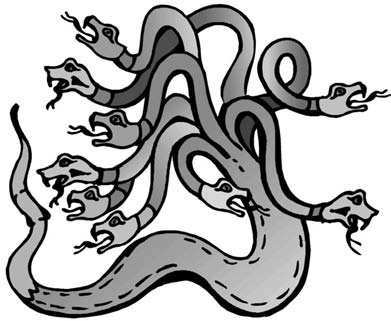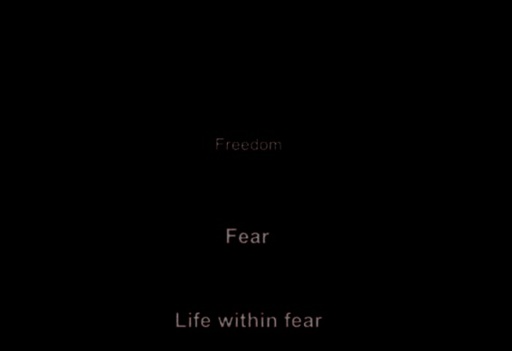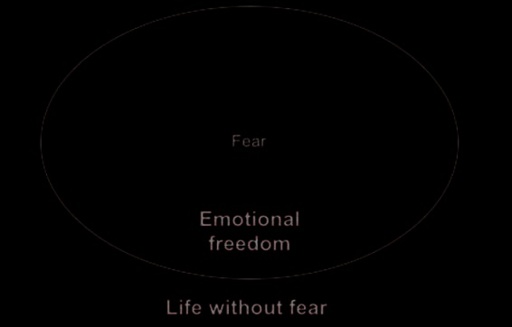Free Yourself from Fears (28 page)
Read Free Yourself from Fears Online
Authors: Joseph O'Connor

Freedom
from
fear is a lot to do with what you choose to pay attention
to
.
223

Freedom From
Social Anxiety
Society, my dear, is like salt water, good to swim in but hard to swallow.
ARTHUR STRINGER
EMOTIONAL FREEDOM MEANS that you will see all the myriad social anxieties for what they are—a choice;
one
way to live, not
the
way to live.
These social “under-thoughts” generate a host of specific fears, which cannot be conquered fully without tackling the root causes—the social assumptions behind them.
The Hydra of social fears
The specific fears are like the heads of a mythical monster called the Hydra. According to Greek legend, the Hydra lived in the swamps near the ancient city of Lernea. It looked like a dragon with nine heads. To kill this monster, you had to cut off the heads, but every FREEDOM FROM SOCIAL ANXIETY
time you cut off one head, two more would grow in its place. One of the nine heads could not be harmed by any weapon. The Hydra would come from the swamp regularly and terrify the countryside, eating people and cattle, nine at a time.
Eventually the monster came to the attention of the hero Hercules, as one of his 12 labors to atone for killing his family. Hercules’ original strategy was to cut off the Hydra’s heads, but he soon realized that this would only make things worse, so he got his friend Iolaus to cauterize the neck every time he cut off a head and this stopped the head from growing again. After a heroic battle, Hercules managed in the end to cut off all the heads but one. This last head could not be killed, so Hercules crushed it with his club, ripped it off, buried it, and put a large stone on top.
Unreal fears are like the Hydra’s heads, a violent metaphor but a very fitting one. They need to be cut, but also you have to stop the thinking—the social under-thoughts that generate the fear in the first place. This cauterizes the fear so that it cannot grow again.
Beheading the Hydra
This book is full of stylish NLP swordplay to cut off the head of your particular fear. All the moves have three things in common: J Recognize the unreal fear and what it does.
J Recognize and retain the positive intention.
J Change the strategy that creates the fear.
What are the social under-thoughts that generate so many fears?
What gives rise to the Hydra’s heads?
J The first head is generated by
blame
. When you blame others or yourself, you will be afraid of the consequences of some undefined punishment or being found out. The fire to cauterize this neck is
responsibility
. Take responsibility for your own actions and 225
FREE YOURSELF FROM FEARS
change what you can. Many people and events have contributed to the situation. No one is to blame.
J The second head is generated by
information overload
. When you have too much information you cannot get the information you need to appraise a situation and know if there is anything to fear.
You may be afraid that you have missed something and in the end opt to be “better safe than sorry.” The fire for this neck is
precision
questions
that come from clear and precise goals.
J The third head is
time pressure
. Time pressure makes deadlines that cause anxiety and worry. The fire you need is
perspective
. You choose how you see time. When you see your timeline in perspective you can plan your work so that whatever strategy you use, the deadline will be motivating rather than fear provoking.
J The fourth head is
fear of the future
. The future does not exist yet; we create it from what we do now. All fear of the future is unreal.
The fire is an
action plan
from a clear goal. You do what you can and get help where you need it. Many problems cannot be solved alone: think globally—act locally.
J The fifth head is
too much choice
. Too many options are confusing and can make you afraid of missing something, and lead to a kind of paralysis. The fire is
balance
. When you balance your tendencies for maximizing and satisfying, you will make good choices. Good enough is good enough. Remember the rule of three: narrow your choices down to the best three available.
J The sixth head is
change
. You cannot stop change, but you can
manage the transition
that gives changes their power to frighten you, which is the fire you need here.
J The seventh head is an excessive
focus on achievement
. Fear of failure follows quickly behind. The best fire to apply is a
focus on being
.
Achievement is about doing and it tends to define you in terms of what you do. Who are you really? Much more than your achievements. All your achievements are generated from you and you are greater than anything you can do. When you focus on being you will be more in the present moment and get happiness from the journey toward your goal, not just from arriving at the destination.
226
FREEDOM FROM SOCIAL ANXIETY
J The eighth head is generated by
limiting beliefs
. When you believe you are less than you are, you will be afraid to try, because you fear failure. Limiting beliefs make you less than you are.
Humility
is the fire to apply. Your beliefs are not the truth, they can be wrong. All you know is that you have not reached your limits. Paradoxically, humility will allow you to discover that you are greater than you think.
J
Loss
is the ninth head. Perhaps this is the head that can never be killed completely, only buried. Loss is part of life. Some things we choose to leave, others are ripped away from us. Sometimes despite everything, we suffer loss. We lose something that is dear to us and it was not our choice.
Life in the present moment
We cannot be conquered by loss, because we are more than anything that we can have, or think, or possess, or mourn. We cannot control events, but we can control our reaction to them. We cannot control the outside world, but we can have choices in our inner world. We cannot control other people, but we can wish them well and help them to be the best they can be. We can never know ourselves completely, so we can never control ourselves either, because we are more than we can know. We can witness everything that happens, the joys, pain, love, and hate, and know that everything we see out there has its shadow inside us, that we are part of the world and we cannot make ourselves separate from it.
Buddhists have it right. If you are not attached to anything, you cannot lose anything, but you will still feel the pain of loss. Do not deny the pain—it means that you care and that you are alive.
227

Emotional Freedom:
Here and Now
Learn from yesterday, live for today, hope for tomorrow.
ALBERT EINSTEIN
WE ALL WANT EMOTIONAL FREEDOM—to live life free from unwanted fear.
Primary fear will always be there to protect us, but many people live their lives within fear: fear of risk, fear of failure, fear of authority, fear of loss. They live inside a barrier. When we live most of our life
inside
fear, we will be unhappy.
Instead, live outside the fears so that they do not restrict you.

EMOTIONAL FREEDOM: HERE AND NOW
When you live most of your life
outside
fear, you live a life of emotional freedom. With NLP you have choice about what you feel. You need a full range of feelings, even the so-called bad ones—grief, sadness, and anger. They all have energy and purpose. You can decide to stop some, and you can feel fully the ones you choose to feel.
You will never be free of authentic fear, nor would you want to be.
Authentic fear remains as an instinct, a biological reaction, keeping you safe and giving you the extra energy to fight or flee.
Emotional freedom means no corrosive worrying. You will not have any more sleepless nights worrying about family, money, work, bills to pay, or anything else. All these are important, but worrying is not the way to deal with them. Instead, you will have a goal and an action plan. You don’t know whether it will work, but you will have done your best and there is nothing more to do at that moment.
Emotional freedom means that you are free from unreal fear and you can discover your true talents. Fear stops you from attempting so many wonderful things.
229
FREE YOURSELF FROM FEARS
What would you do if you knew that you could not fail?
How important are those things?
Could fear of failure be stopping you right now?
Opening doors
Emotional freedom gives you more possibilities. Many doors open to you that fear had closed. You never know what is possible if you don’t try. Freedom from fear gives you a much more realistic view of yourself. You will know yourself better. You will know your limits, because you will not be afraid to test them. You will know what you like and what you do not like. You will be more authentic. When you are more authentic, you will also be able to commit to another person if you want to—
you
will decide.
Emotional freedom lets you see the positive intention behind the fears and take care of that in a way that is less stressful, less limiting, and more joyful.
Courage
The way to conquer all fear is to take action. When someone acts bravely, we say that they have courage. But is courage something they
“have”? Courage is not a mysterious, ether-like quality that some people possess and others do not. Courage is how we describe the actions people take to face their fear and to conquer it. Courage is action.
Courage takes you through your fear and out the other side.
One thing I have learned in dangerous cities such as Rio is that if you think you are being followed, stop and look into the follower’s eyes. See them and let them know you have seen them. You may fear 230
EMOTIONAL FREEDOM: HERE AND NOW
them, but you face them anyway. This keeps you safer than pretending not to notice, or ignoring the possible danger.
Courage helps you feel the fear and do it anyway. There is a nice moment in the film
The Three Kings
. This is centered around a group of American soldiers fighting in Iraq. Three of them are out in the desert and have to make a decision whether to go back for their cap-tured comrade. One of the soldiers is very afraid. The second soldier, played by George Clooney, says, “You don’t get courage to help you do something you are afraid of. You start doing it and then you get the courage.”
Courage is the link between fear and action. Our imagination, one of our greatest gifts, comes like all great gifts with a double edge. We can imagine wonderful futures and be inspired. Equally, we can imagine awful futures and be afraid. Courage helps us to imagine the wonderful futures and deal with the awful ones. Although the title of this book is about fear, it is really a book about courage.
Finally, there is a skill in Part I of this book (page 33): “What are you afraid of?” Here is a final exercise to close that circle. When you have done it, compare your results to those in the first exercise and notice the changes. Try it. What are you afraid of?